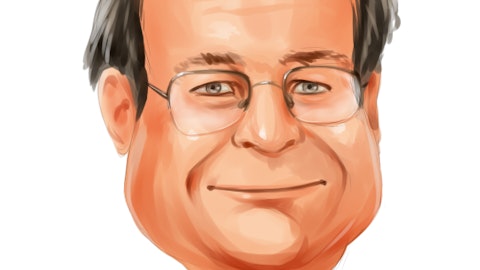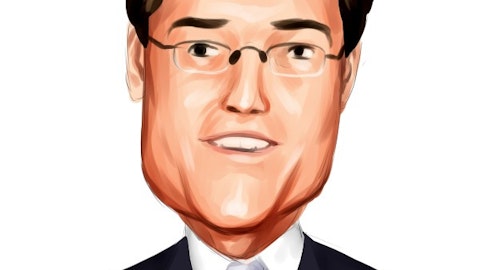Apple, Inc. (NASDAQ:AAPL) has become so large that some analysts refer to it as a separate asset class. There are stocks, bonds, commodities, and then there is Apple. It has the largest market capitalization of any corporation in the world, and not surprisingly, is the largest holding of among hedge funds. Does that mean it should be in your portfolio?
Apple’s products seem ubiquitous. In the opening ceremonies of the 2012 Olympics, many of the athletes in the Parade of Nations brandished iPhones and iPads that they were using to take pictures of the momentous event, to be Facebooked or tweeted almost immediately. At some point, it seems, the law of large numbers should slow down the awesome leviathan that Apple has become.
Recently, in fact, Apple disappointed its many fans by issuing guidance for its fourth quarter that was well below that of analysts, after missing estimates for its third quarter earnings. Its stock price tumbled 6% on the news, but quickly recovered within a few days, as investors found the dip a reason to buy.
There are a number of reasons to remain bullish on Apple’s stock. First of all, on a fundamental basis, Apple, Inc. (NASDAQ:AAPL) is still cheap relative to its growth rate. It has a price-to-earnings ratio about 14 versus a five year growth-rate in earnings of 65. It has an impeccable balance sheet with a debt-to-equity ratio of zero. The company has well over $100 billion in cash, enough to buy a small country.
But how can Apple maintain its healthy growth rate given its huge size? Where will it find more consumers?
It should be remembered that despite its enormity, Apple doesn’t actually have a dominant position in most of its major markets. Apple, Inc. (NASDAQ:AAPL) didn’t drop the computer from its name until 2007, but in all the years since its inception in 1976, Apple never had more than a 10% share of personal computer sales. For all the ubiquity of iPhones, with their eerie Siri app, they are second to Samsung (KRX:005930) in smart phones. Amazon’s (NASDAQ:AMZN) Kindle e-books books still outsell iBooks by a large margin. So Apple can still grow earnings by growing market share.
But the history of Apple is a textbook case in creative disruption, starting with the original garage-built computers, which altered the computer industry forever. Apple has changed the consumer distribution of music with its iTunes, ravaging the markets for CDs. The iPhone has set the standard for smart phones, leaving Blackberries behind and their maker, Research-in-Motion Limited (NYSE: RIM) struggling for relevance. Nokia Corporation (NYSE:NOK) seems like a distant memory.
One aspect of Apple’s creativity is that all its products seem to be part of an Apple gestalt, what business journalists like to call the “Apple ecosystem.” Not only are all the products superficially similar in their sleek simplicity of design but they operate in similar fashion, using a common iconic language. It is not hard to imagine a near future where all things digital are delivered through Apple products and civilization itself is controlled by an artificially intelligent agent, appropriately called the AppleCore.
What’s up next? Well, there is the iPhone 5, rumors of which are already sweeping the Twittersphere. The wait for the next phone is probably cannibalizing sales of current iPhones. The new iPhone will be faster and smarter, run a new operating system, and have a slightly larger screen. It may or may not have a near field communication system for mobile payments.
Then there is the long-rumored Apple TV set. The company already makes a set top box, for channeling the internet and iTunes through your current set. But coming up is a real Apple-engineered physical TV set to take on the consumer electronics giants, like Panasonic Corporation (NYSE:PC) and Sony Corporation (NYSE:SNE). Though the rumors have been out there for years, Piper Jaffrey’s Gene Munster believes a launch will be announced at the end of this year, with the actual rollout in 2013. And you can bet that an Apple TV will have applications that no one has connected with a TV set before. And Apple will be ready to supply content as well as hardware. Ultimately, Apple will be happy to displace your cable or satellite provider.
If TV seems a little mundane, then how about an Apple iCar? Nuts? Well, think about it. Cars are electronic now, aren’t they? Your new iCar could have iPad nav screen, you could download iTunes to your built-in iPod, and have a voice-activated no-hands iPhone on which to ask Siri where to find the nearest Apple store, while the toddlers watch cartoons from the back seat on the iTV. So what if the company has no experience with trivial stuff like drive-trains and huge batteries? Buying out Tesla Motors Inc. (NASDAQ:TSLA) is well within Apple’s reach.
If you have a large portfolio, there should be a place in it for Apple, Inc. (NASDAQ:AAPL). It’s like owning a little bit of the future today. Though its spiritual leader, Steve Jobs, has passed on, he managed to imprint his personality on the whole company before doing so.
Note: This article is written by Steven Edwards.


